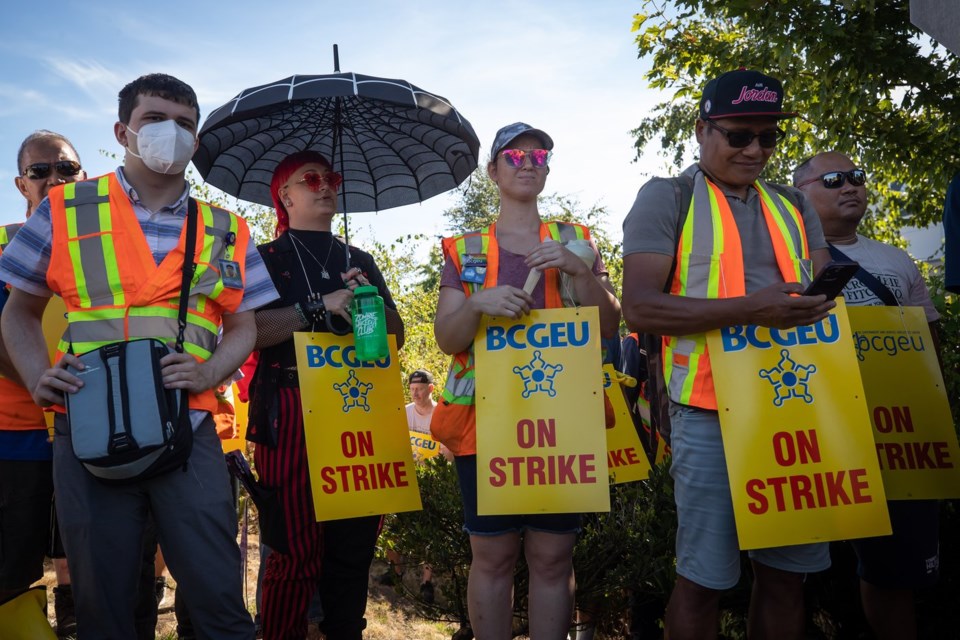British Columbia public service workers have voted overwhelmingly to approve strike action that could begin as soon as next week.
Paul Finch, president of the BC General Employees' Union and public service bargaining committee chair, told a news conference on Friday that 72-hour notice of a potential strike had been issued, meaning action could start at 12:01 a.m. on Tuesday.
Finch said "members are fired up" and the 92.7 per cent support for strike action represented an "overwhelming mandate for fair wages."
He said he would not get into "too many details" about what might happen on Tuesday, which marks the return of school after the Labour Day long weekend.
"What I will say is that we have taken great care with our strike planning in the event that we do have a strike," he said.
"Obviously, our hope is that the government comes back with a revised wage mandate."
He said 86.4 per cent of Public Service Agency members in the union voted. The BCGEU has about 34,000 members.
When asked how the public might react to potential job action on the day school resumes, Finch said he was confident the public will "remain on side."
"If you see a picket line, do not cross that picket line," Finch said.
Acting deputy premier Mike Farnworth told a separate news conference after the announcement of the vote that services protecting the "health, safety and the welfare" of British Columbians would be protected under existing agreements for essential services.
Farnworth said "agreements are made at the negotiating table" as he declined to describe the last offer to the union.
The government's so-called Shared Recovery Mandate to guide negotiations applies to all public sector workers with unionized employees whose collective agreements expired on or after Dec. 31, 2021.
Its elements include three-year terms, general wage increases in the first year of $0.25/hour plus 3.24 per cent, then 5.5 per cent in year two, plus a potential cost-of-living adjustment to a maximum of 6.75 per cent.
Finch said discussions broke off with the union seeking a four per cent general wage increase in the first year and 4.25 per cent in the second year, as well as a cost-of-living adjustment that he did not specify.
Finch said the average BCGEU member made on average 2.7 per cent less than the average B.C. worker.
He also cited union figures suggesting 22 per cent of BCGEU members are "working a second or third job" with half of the membership living pay cheque to pay cheque.
"Those are the members who voted to strike today," he said.
"The members, who are struggling recognize that they cannot keep going on the wages that the government is offering, and they have made an incredibly difficult decision to stand up and say that they need more to get by."
Members of the Professional Employees Association, who also work for the Public Service Agency, also announced they had voted in favour of taking job action and would issue simultaneous strike notice.
Melissa Moroz, executive director of the association, said it made a strategic decision a year ago to "stand beside the BCGEU."
"Their fight is our fight, and we are united as workers in the public service," she said.
Finch said he hoped the government would come back with a revised wage mandate and that a strike could be avoided next week.
But he said the "emphatic strike result reflects the seriousness of the affordability crisis that our members are facing."
He said in a statement that government's current offer doesn't meet the "urgency of this crisis" and this "emphatic strike vote result reflects workers’ deep concern over the lack of progress at the bargaining table."
The union said the strike vote was called after a breakdown in negotiations between the union and the agency last month.
Voting began on Aug. 11 and closed at noon Friday.
This report by The Canadian Press was first published Aug. 29, 2025.
Wolfgang Depner, The Canadian Press



